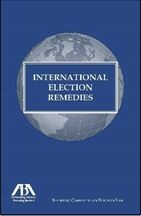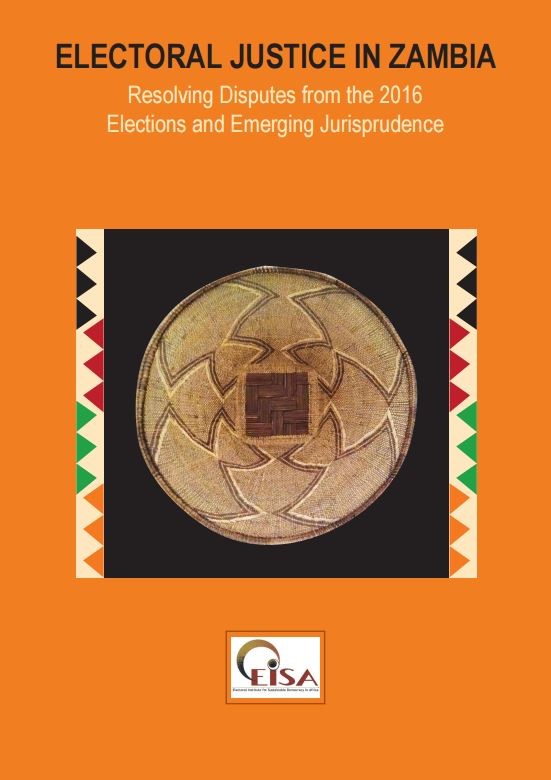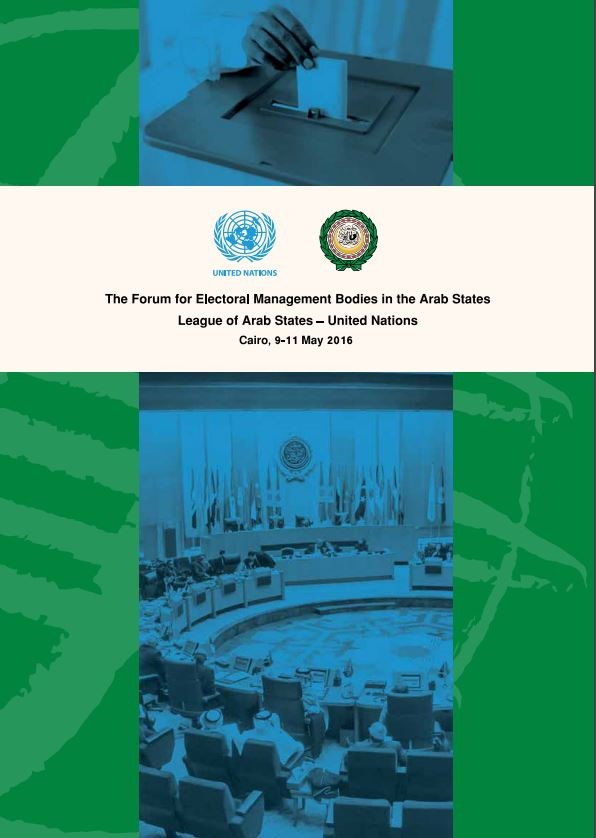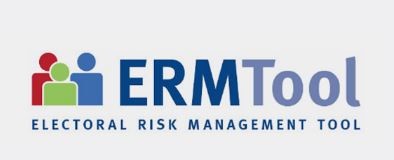ACE Updates May 2017

|

Dear readers, The ACE team is considering how to improve the ACE website to provide you with the most relevant content and pleasant user experience. Please take a few minutes to complete this short survey in order to inform our approach. Results from this survey will also be discussed at the upcoming ACE Steering Board meeting, which will bring all ACE partners together at Elections Canada in late June. The May 2017 edition of the ACE Newsletter further highlights:
The ACE Electoral Knowledge Network promotes credible and transparent electoral processes with an emphasis on sustainability, professionalism, and trust in the electoral process. ACE offers a wide range of services related to electoral knowledge, assistance, and capacity development. Thank you for reading May’s newsletter and for your involvement with ACE. We look forward to your contributions to the Network! Best regards, The ACE Electoral Knowledge Network This newsletter is also available in PDF format.
Feature: Women and Elections: Interview with Ms. Halima Ismail, Chairperson of Somalia’s National Independent Electoral CommissionInterview conducted by Razan Masad, UNDP Regional Electoral Support ProjectACE is excited to share an interview with Halima Ismail, the first woman Chairperson of Somalia’s National Independent Electoral Commission and the only female chairperson in the Arab World. Ms. Ismail discusses how her career working with women and girls in civil society led to her election as the first president – and first female president – of the election commission in Somalia. She also provides insight into the challenges she faces as a woman in this field, as well as her vision for strengthening the role of women in the electoral process and improving election management in Somalia more broadly. How did you career development start and ultimately lead you to the field that you are in? My work in this field started with a simple idea; to have an active role in civil society at a time when my country needs it the most. After the civil war in Somalia in 1990, whose biggest victims were women and children, a group of Somali women gathered to form a women's development organization called the International Development Association (IDA) forming the women's agenda for the Republic of Somalia. My role as this organization’s regional coordinator taught me the significance and impact that civil society can have, whether youth or women, but especially women in influencing our society. I then joined [United Nations] operations in Somalia, where I served as a political officer to assist in the reconciliation processes and to build regional and local councils based on women's participation in political leadership and decision-making processes. How did your involvement in the political and electoral field start? The political situation in Somalia between 1993 and 1997 caused the UN operations in the Somali Republic to withdraw, and the unsafe conditions forced me to leave Somalia and move to the United States of America. However, I soon felt the need to return and focus my energy on standing with my community and my country. With determination for change, I first started working with the province of Lahud in central Somalia, a region that had been marginalized and financially neglected by international organizations over the years. I raised funds to be allocated to girls' education, social cohesion, and meeting the basic needs of the governorate. [Because of] my work in the development of communities in Lahud, as well as the trust of the citizens that I had gained throughout the processes, I was appointed as chairperson of the committee responsible for the formation of the central regional state and was a member in the high-level discussions on the formation of the new government in the Republic of Somalia. This was the beginning of my experience in political and therefore later electoral processes. How did this work lead to the establishment of the National Independent Electoral Commission, and how were you selected as its president? While Somalia was undertaking a political transition, the [Constitution was amended in 2012]. The amendment to the law declared that a national committee for electoral matters should be established and nine commissioners appointed to lead it. The Somali parliament then announced a subsequent law to outline how the commissioners were to be chosen. At the time, I had applied to work in the Commission, which my active role in civil society pushed me to do. Of 367 candidates, I was chosen as one of the 9 commissioners. An election was then held amongst the 9 commissioners for a president for the commission, and to my surprise, I was chosen. And so here I was, the first ever Somali woman to be elected as the first president of the election commission in Somalia. In what context was the commission established? And what is your vision for its work in the future management of elections in Somalia? At the time of the establishment of the commission, no elections had been held in Somalia since 1969, due to the army's seizure of power for 21 years and the subsequent civil war which lasted a devastating 25 years. This situation in the country made the establishment of a national body that can manage elections in the country an even more important and pressing priority. The establishment of a body that can hold free and fair elections for the first time in nearly 50 years was now a must. My vision for the commission is first and foremost to fulfill its objective to hold such elections successfully. I aim to establish the infrastructure needed for this, and to gain the confidence of Somali citizens in the electoral process. What were some challenges you faced as a woman in your field? Being a woman in Arab society is in itself a challenge. It was very difficult for the Somali society, with many customs and traditions, to accept me, a woman, as a head of the election commission. In the past, the norms in Somali society have limited the role of women to being mothers and housewives, which prevents women here from achieving what they set out to do. There were many instances where intimidation was used against me and other women in this field. However, I rejected the traditional "role of women" and the mold set for us by society, and persisted to complete my mission. If you were to give advice to girls and women in the Arab world who want to pursue a career in politics or elections, what would it be? One of the most important factors that contributed to my success in this work, and continues to do so, is the support from my female colleagues. It is extremely important for women out there not to be the obstacle standing in the way of another woman’s success, but rather enable and encourage it. Women must stand side by side, especially in our Arab societies. In addition, women should not be intimidated to challenge existing customs and traditions and not allow them to stop them from reaching their goals. Finally, what role does the NIEC play in promoting women’s participation in the electoral processes in Somalia? One of our most important goals at the commission is to strengthen the role of women in the electoral process, both as decision makers and as voters. While it is true that there is a long way ahead, I am optimistic and believe greatly in the capacity of civil society in Somalia. We are currently working on mainstreaming gender in all aspects of our work, in order to create a secure and accessible environment for women to participate in the electoral process. We want to enable women’s voices to be heard, as they are without doubt a vital part of their country's future. Finally, I would like to add that the commission is currently working on establishing a quota of 30% for women in parliament.
Practitioners' Network Updates
Consolidated replies are published summaries of the discussions on the Practitioners' Network. The following page highlights some recently published consolidated replies, including: Election security planning for police officers, Professionalization of electoral civil service, Preventing and mitigating electoral violence, External Relations Staffing Best Practices, International Search for Ballot Boxes, and International observer reports and election disputes. Dozens of questions have been consolidated already, so be sure to look here for a full overview.
Recent Consolidated Replies
ACE Encyclopaedia: The Latest UpdatesIf you would like to see a particular topic addressed in an ACE Focus On or translated into Spanish, French, or Arabic please send your suggestions to [email protected].
Recent Publications by ACE Partners and Members of the Practitioners' NetworkInternational Election Remedies (contributions from IFES and The Carter Center) Derived from the fundamental human rights of political participation and universal suffrage, the right to an effective remedy is well established in international law. This publication of the American Bar Association’s (ABA) Standing Committee on Election Law explores a range of considerations in understanding the right to an effective remedy in election disputes, including international standards, what actually makes a remedy effective in cases of fraud and malpractice, and the need to balance timeliness and due process in resolving disputes. Election experts from the International Foundation for Electoral Systems (IFES) and The Carter Center contributed several chapters to this publication, released in November 2016. Electoral Justice in Zambia: Resolving Disputes from the 2016 Elections and Emerging Jurisprudence (EISA)Women and Poltical Transition: The Risk of Replicating Inequality and the Fundamental Need for Gender Parity in Decision-Making (IFES) This research report was commissioned by the Electoral Institute of Sustainable Democracy in Africa (EISA) following the 11 August 2016 general elections in Zambia with the aim of contributing to stronger election dispute resolution mechanisms in the country. The report documents, reviews and analyses the courts’ decisions of the 2016 election petitions, and examines emerging jurisprudence. It also provides recommendations for electoral justice in Zambia. Report on the Forum for Electoral Management Bodies in the Arab States (UNDP) The Forum for Electoral Management Bodies in the Arab States, which took place in Cairo from 9-11 May 2016, was the first of its kind event which brought together officials and representatives of electoral management bodies in the Arab States. The event was a partnership between the League of Arab States, the United Nations Department of Political Affairs (Electoral Assistance Division) and the United Nations Development Programme (UNDP). Electoral Risk Management Tool Version 7 (International IDEA) The Electoral Risk Management Tool (ERMTool) is designed to empower people to ensure peaceful and credible elections. Intended users are electoral management bodies, security sector agencies, civil society and other state and non-state actors. The ERMTool aims to build the user’s capacity to understand, analyze, and mitigate electoral risks. To learn more about the ERMTool please visit International IDEA’s website.
|

|





